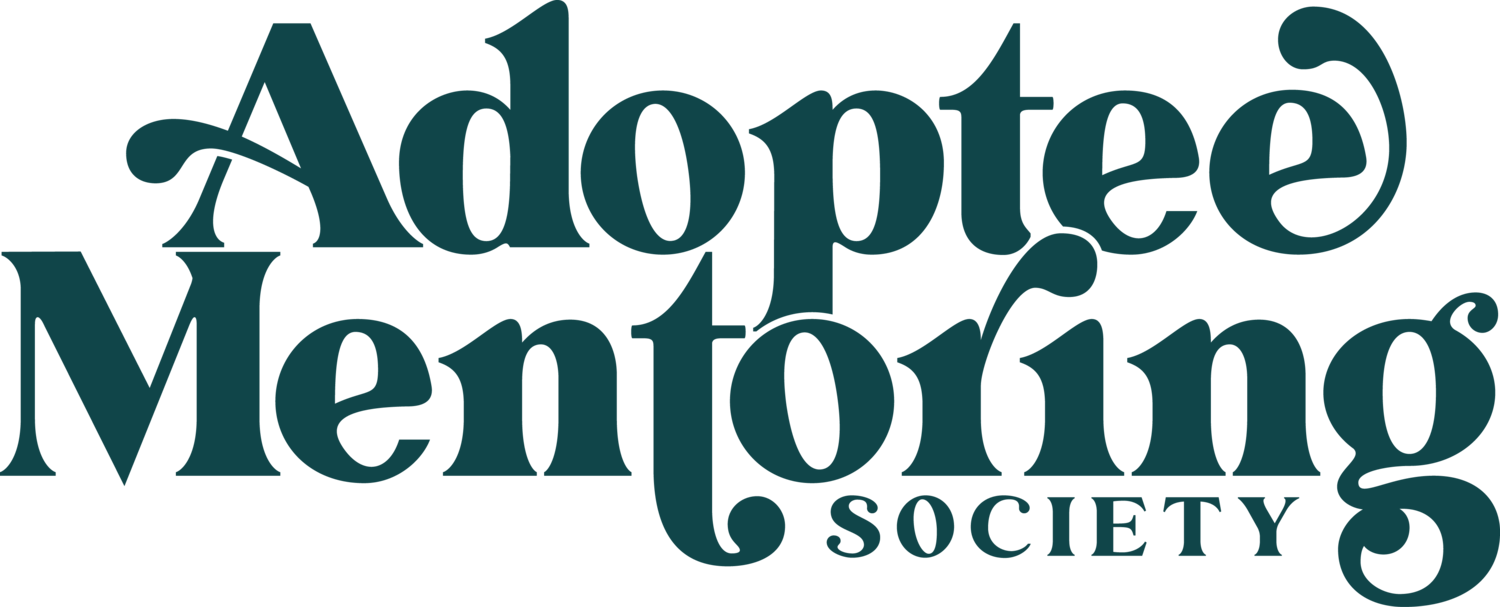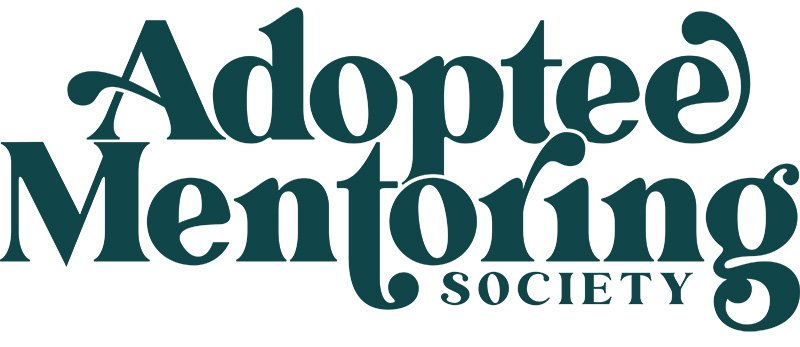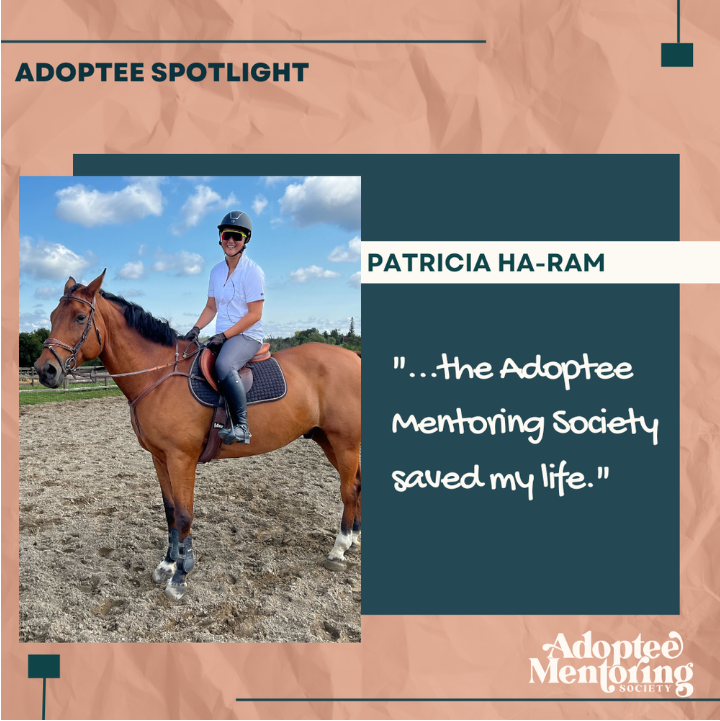“My Story Is Not Unique”
By Patricia Ha-Ram Krijgsman-Wentzel
Patricia Ha-Ram Krijgsman-Wentzel is an elementary school teacher based in Toronto, Canada, working at an inner city school. She’s passionate about educating her students on what diversity, equity, and inclusion looks like, and in her free time she is an amateur show jumper and dog mom.
Pat’s Adoption
Through a closed adoption from South Korea, Pat was adopted in 1989 through HOLT. Arriving on the first Korean Air flight to Canada, she came to her adoptive Irish/British family in a cardboard box. Pat has one sister who is the biological daughter of her adoptive parents.
AMS Impact
Pat found the Adoptee Mentoring Society through Google saying “Google knew I needed community somehow and I saw a link on it online”. Pat has since had various one on ones with Angela and is part of a smaller AMS group that meets monthly. The impact of AMS is felt deeply by Pat.
“For me, AMS saved my life. It gave me community, a sounding board, and a place to be heard and seen for who I am. A place where I know I can just be, without judgment or stereotypes. The most rewarding aspect of AMS is the ability to give to others, hold space for others, the way other adoptees gave to me and held space for me.”
Transracial Adoption and Identity
Continuing to struggle with her identity, Pat tries to consolidate how she looks as a person of color and who she feels inside because of how she was raised. She credits therapy and AMS for helping her work through these aspects.
“I wish I had more understanding and exposure of what racism would look like for me as a child and how I would better understand that it wasn’t an issue I needed to internalize.”
Culture has affected her in many ways. Understanding she is a product of white privilege and struggling to connect how she was raised with how she is treated in the world - because they are very different. She does not subscribe to anything traditionally “Korean” besides her love for the food because she had no real exposure or ability to understand Korean culture as a child. She deeply believes in the nature vs. nurture theory and would argue that she is an ideal example of what that looks like.
“Coming Out of the Fog”
Pat thanks the Black Lives Matter movement for pushing her out of the fog. She didn’t understand what her privilege was or see it for what it was until she began to identify as a POC. After coming out of the fog, she knew that she could no longer live her life without addressing her identity issues, in a real way.
“I was never told I was different than my adoptive family, or diverse in any way, so when I was met with racism as a child or more recently and aggressively, during COVID, I was told that person “must be having a bad day” or “they don’t know you’re adopted”. These sentiments from my adoptive family enraged me to the point that our relationship ended.”
She struggled with her family’s inability to understand how she was feeling as an adoptee and a POC and that “not seeing color” was a micro-aggression and racism in itself that belittled her existence. Now, she feels she is developing the ability to hold her own as a POC, an ally, and someone who was born in Korea.
Adoptee Histories
When asked about current adoption policies, Pat shared that she thinks legislation and adoptee rights are not often discussed because adoptees are trying to deal with their trauma. She thinks more exposure to Adoptee Rights will help to alleviate issues for future adoptees.
“My story is not unique.
My story is not fair.
My story is not equitable.
My story is not humane.”
More personally, growing up she had been told her birth mother was deceased. When Pat began researching her birth family’s history she corresponded with the social worker at Post-Adoption Services, and it came to light that her birth mother was alive, although she had been told she had attended a funeral for her birth mother in 2010. She quickly realized the story and subsequent funeral were a scam created by a private company that preyed on returning adoptees to turn a quick profit.
This story and narrative continue to this day, the Korean Government is currently seeing lawsuits filed against them by large class-action groups, as well as individual Korean Adoptees for the inequitable mistreatment of Korean adoptees and their birth families.
To help rectify painful situations like this, Pat would like adoption agencies to require one parent of adoptive families to have the same ethnic background as the child they are seeking to adopt. She would require adoptive parents to go through racial tolerance, diversity, equity, and inclusion training that would be ongoing. She would require adoption agencies to find families for the children in their care, rather than find children for paying families. She would require adoption agencies to keep stricter records and follow up with adoptive families until the adoptee reaches their respective age of majority. She would require all countries to treat their adoptees with the same rights and privileges as they do their non-adopted citizens.
For Adoptees
Pat has many hopes for current and future adoptees. Wanting adoptees to get support and community, as well as have adoptive families that educate themselves on what adoption trauma looks like. She would like adoptive families to educate themselves on diversity and equity and how all of those things look and sound when raising a transracial adoptee.
“ I hope that they [adoptees] seek therapy when things get difficult because they will. I hope adoptees understand who they are and where they come from and make those priorities in their lives. I hope to be the support I wish I had.”
As an adult TRA, Pat shares her recommendations for adoptees.
““My advice is to talk. Talk to someone about how you feel. Talk to someone about how you don’t feel. Talk to someone who will listen to, and respect your feelings about your own adoption. I have found that even though I don’t want to talk, things feel lighter when I do.””


